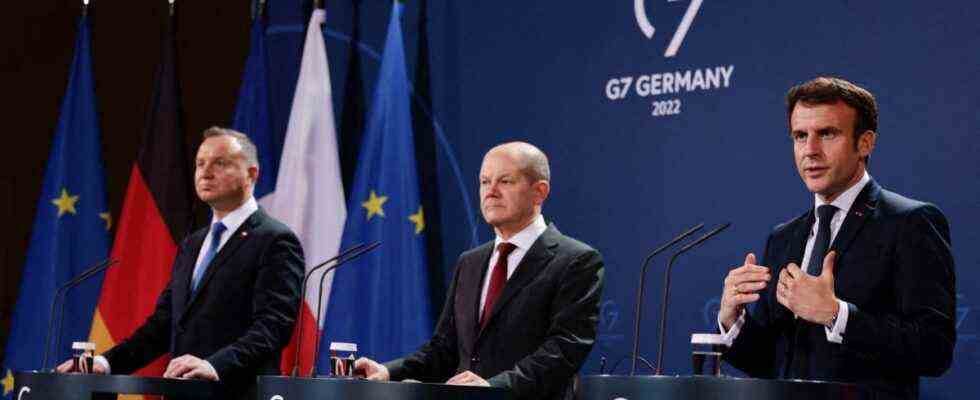After the inaugural visit by Federal Chancellor Olaf Scholz (SPD) to Washington, European crisis diplomacy to prevent a war on the Russian-Ukrainian border has picked up speed. The efforts converged on Tuesday evening in Berlin, where Scholz received two of his most important allies in the Chancellery, French President Emmanuel Macron and Polish President Andrzej Duda, just hours after his return from the United States. “Our common goal is to prevent a war in Europe,” said Scholz at a joint appearance before the actual deliberations.
The tripartite summit in the format of the so-called “Weimar Triangle” also wanted to prepare for the visits to Ukraine and Russia planned by Scholz for the beginning of next week. Scholz had already announced in Washington that the Russian President Vladimir Putin would be given a clear, unified message that an attack on Ukraine would demand a high price.
Duda called the meeting “historic”. Europe is in the most dangerous situation since the Iron Curtain fell in 1989, he warned. Macron also emphasized the solidarity of the three states, saying that the danger could only be averted with diplomacy. The French President was optimistic. In the past few days, “new approaches” have been developed that should now be pursued. He did not give details.
Before the stop in Berlin, Macron had first visited Russia and then Ukraine and expressed confidence that the meeting with President Putin would help prevent further escalations on the Russian-Ukrainian border. However, Moscow has denied alleged promises to Paris to suspend maneuvers on the border with Ukraine. Russia sent six warships from the Mediterranean to the Black Sea.
Macron fueled hopes of being able to bring Russia and Ukraine back together for talks. Both Putin and his Ukrainian counterpart, Volodymyr Zelenskiy, have promised to abide by the so-called Minsk Agreement. “We now have the opportunity to make progress in the negotiations,” Macron said after talks with Zelensky in Kiev.
At his meeting with Scholz, US President Joe Biden left no doubt that the controversial Nord Stream 2 natural gas pipeline would not go into operation in the event of a Russian invasion. The project would be “dead,” Biden said. Scholz said the West would bear all sanctions together. He avoided mentioning specific sanctions such as Nord Stream 2.
Foreign Minister Annalena Baerbock (Greens) visited the front line in eastern Ukraine on Tuesday. It was her second visit to Ukraine. She spoke of “very depressing pictures”. The conflict can only be resolved diplomatically; she will “do everything to ensure that people can live peacefully here in Europe”. It is important that the independent observers of the Organization for Security and Co-operation in Europe (OSCE) can work on site.

